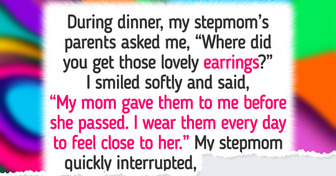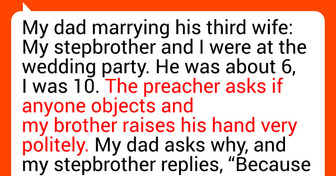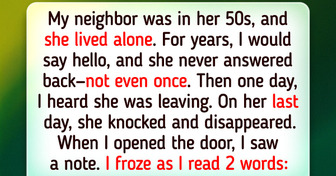12 True Horror Stories From Parents Who Decided to Trust a Babysitter

You’re trembling. Drops of sweat are dripping down your face. Your frightened eyes look up, watching a big flying bug. The Asian Giant Hornet, the size of a thumb, is hovering above you.
It’s one of the most dangerous insects on the planet. And not just because its sting looks like a needle. This insect can cause a real economic crisis all over the world and lead to the mass extinction of many species of living creatures on Earth.

But we can speak about it later because now, it’s going to sting you. The sting of the giant hornet is one of the most dangerous and painful among insects. You’re about to find out what happens to the human body after the sting pierces the skin. There’s no point in running; the hornet will catch up with you anyway.
It flies around you. You hear a strange crackling sound. The hornet flicks its jaws to scare you and keep you at a distance. After a couple of seconds, it attacks. The hornet stings you right in the shoulder. Oh, it doesn’t care about your clothes. The stinger can pierce through a thick layer of fabric and even a beekeeper’s protective clothing. You need a special suit similar to a spacesuit to be protected from the hornet. Unfortunately, you don’t have one.
In the beginning, you feel as if a red-hot needle is piercing your body. Through this needle, the hornet injects poison into your skin. This substance dilates the walls of the blood vessels around the bite, which makes your skin turn red. Your body fights the foreign substance and sends out immune cells. But the venom destroys your defense cells, causing your skin to swell.
The infected blood is filtered out by the kidneys. The poison contains a substance that is toxic to this organ. But your kidneys don’t bother you as much as your shoulder. The bite site is swollen and red. It’s burning. The swelling can last from hours to days! It’s only one hornet, but it can sting you ten times. Just imagine what would happen if you stirred up a nest. You would have to hide in dense bushes or jump in the water to escape. If you get stung several times, you need to go to the hospital.
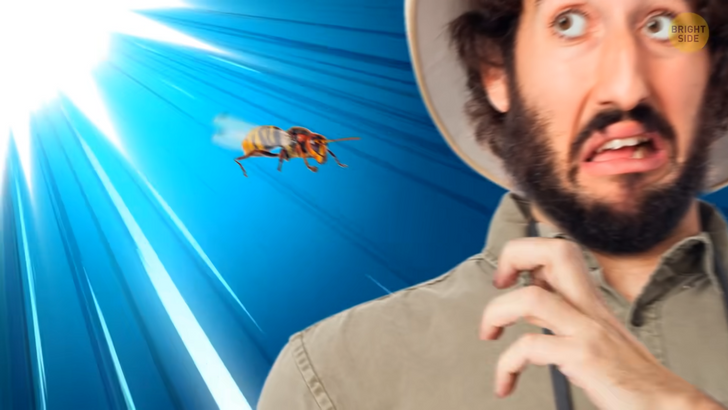
In any case, you’re lucky that you don’t have severe consequences. People with allergies should stay away from giant hornets. The sting can be catastrophic for their bodies. To avoid coming across these monsters, stay away from their nest. You can hear an alarming buzzing sound from afar. Asian giant hornets are aggressive and will sting anyone who walks past their nest. Authorities always get rid of their nests if they appear within the city limits. But not only to stop them from attacking people but also to prevent the apocalypse. And here’s how it can happen.
One of Asian giant hornets’ favorite things is attacking beehives. They fly far away from the nest, and when they find a hive, they mark it with a unique pheromone. The smell attracts other hornets. And even a small group of them can completely destroy the hive. About 20 hornets can wipe out about 30,000 bees. Imagine the damage thousands of hornets can do! This is the main danger they present.
By transferring pollen between flowering plants, bees help them grow, breed, and produce food. Bees pollinate plants that cows and other livestock eat. Thanks to bees, we have cotton growing. If hornets wipe out bees, there will be a worldwide shortage of cotton clothing.
Simple T-shirts, jeans, and jackets will become more expensive and sooner or later disappear from the markets. Many berries and fruits may lose their rich taste and vitamin content. This can lead to a lack of vitamins not only in animals but also in humans.
You won’t be able to put on your jeans and favorite shirt and go to a restaurant for a juicy burger. Eggplants, hot peppers, kiwis, blueberries, cranberries, and other products will disappear from the stores. Entire species of animals will stop existing along with plants. This will lead to an even greater crisis not only in agriculture but also in the world economy. Imagine dominoes falling one by one — that’s what it’s going to look like.

Along with this, the number of hornets will increase. There are almost no animals in the world that could control the growth of the hornet population. If people do nothing, everyone will have to wear thick protective suits to walk outside. Hornets will infiltrate homes and cars and sting people and pets. Of course, people are aware of this danger and take all possible measures to control the population of hornets.
Unfortunately, bees can’t protect themselves. Their sting can’t harm hornets. Bees are much smaller, so they are completely defenseless. But one bee species has developed a fantastic way to resist hornets.
Meet the Japanese honey bee. As soon as a giant hornet enters their hive, they instantly attack it, covering the enemy with their bodies. Once the hornet is trapped in this dense living cocoon, the bees begin to vibrate. Their shaking is so fast that they just burn the hornet. After that, the bees discard the much larger insect and go on about their business.
Well, the strategy is effective for one hornet, but what if many of them appear? Most likely, bees won’t be able to cover all enemies. Besides, Japanese bees can’t teach other bees how to fight hornets. Fortunately, humans control the giant hornet population.
All hornets belong to the wasp family. And among them, the Asian Hornet is not the creepiest insect. How about a wasp that can turn other living things into zombies? “Spider-manipulating” wasps can do that. This tiny insect lives in rainforests. It flies between trees holding an egg most of the day and looks for the perfect host. This host will later take care of the offspring.

The wasp examines the local fauna, sniffs, avoids predators, and... notices a web. The spider uses this web to catch other insects. But this time, the spider has become the prey itself. The wasp is getting closer but doesn’t sting. It just drops the egg on the spider’s abdomen and flies away. It’s done! There’s nothing the spider can do now since the egg is stuck to its back. The hunter probably doesn’t even feel the guest. But then the larva hatches from the egg, and the spider’s life becomes a nightmare.
Day after day, the wasp larva feeds on the spider. It can’t get it off the back because the baby wasp controls its mind. The larva has injected a special substance into the spider’s body. The poison has a terrifying effect on the spider’s brain. Now, the spider cares for the larva’s life more than for its own.
The spider begins to weave an unusually shaped web of stiffer silk. It makes a particular web pattern inside which the larva will be safe. Then, when the baby wasp reaches a certain level of development, it abandons the exhausted spider and clings to the web. Then, it creates a cocoon that will become its home for a while. When the time comes, the wasp emerges from the cocoon. It can fly and is now able to take care of itself.
Whether it’s a female or a male wasp, the insect starts looking for a mate to create offspring. Then, if it’s a female, it lays an egg, grabs it, and begins flying around the jungle looking for a new spider.
There are even more inventive parasitic wasps. Meet one of them! When the female is about to lay her eggs, she starts looking for a babysitter. Aha, a ladybug. The wasp flies up to the beetle and releases a single egg through its sting. When the larva goes out of the egg, it makes its way inside its host.
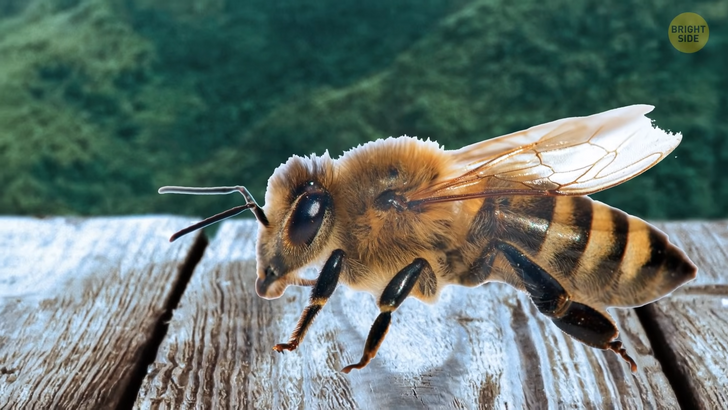
Twenty days have passed. During this time, the larva has developed inside the ladybug, and now it’s getting out. But, the “babysitter’s” job isn’t done yet. The larva creates a cocoon between the ladybug’s hind legs. Inside it, it will evolve into an adult wasp. But to keep the cocoon safe, the larva makes a bodyguard out of its host.
If something dares to come close, the ladybug will do its best to protect the cocoon. When the wasp inside the cocoon is formed, it leaves its bodyguard. The way the wasp controls the ladybug’s mind is still unknown.
There are a lot of parasites besides wasps. Some of them can control animals and even humans!


